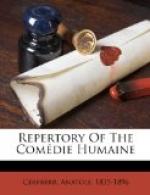INTRODUCTION
Are you a confirmed Balzacian?—to employ a former expression of Gautier in Jeune France on the morrow following the appearance of that mystic Rabelaisian epic, The Magic Skin. Have you experienced, while reading at school or clandestinely some stray volume of the Comedie Humaine, a sort of exaltation such as no other book had aroused hitherto, and few have caused since? Have you dreamed at an age when one plucks in advance all the fruit from the tree of life —yet in blossom—I repeat, have you dreamed of being a Daniel d’Arthez, and of covering yourself with glory by the force of your achievements, in order to be requited, some day, for all the sufferings of your poverty-stricken youth, by the sublime Diane, Duchesse de Maufrigneuse, Princesse de Cadignan?
Or, perchance, being more ambitious and less literary, you have desired to see—like a second Rastignac, the doors of high society opened to your eager gaze by means of the golden key suspended from Delphine de Nucingen’s bracelet?
Romancist, have you sighed for the angelic tenderness of a Henriette de Mortsauf, and realized in your dreams the innocent emotions excited by culling nosegays, by listening to tales of grief, by furtive hand-clasps on the banks of a narrow river, blue and placid, in a valley where your friendship flourishes like a fair, delicate lily, the ideal, the chaste flower?
Misanthrope, have you caressed the chimera, to ward off the dark hours of advancing age, of a friendship equal to that with which the good Schmucke enveloped even the whims of his poor Pons? Have you appreciated the sovereign power of secret societies, and deliberated with yourself as to which of your acquaintances would be most worthy to enter The Thirteen? In your mind’s eye has the map of France ever appeared to be divided into as many provinces as the Comedie Humaine has stories? Has Tours stood for Birotteau, La Gamard, for the formidable Abbe Troubert; Douai, Claes; Limoges, Madame Graslin; Besancon, Savarus and his misguided love; Angouleme, Rubempre; Sancerre, Madame de la Baudraye; Alencon, that touching, artless old maid to whom her uncle, the Abbe de Sponde, remarked with gentle irony: “You have too much wit. You don’t need so much to be happy”?
Oh, sorcery of the most wonderful magician of letters the world has seen since Shakespeare! If you have come under the spell of his enchantments, be it only for an hour, here is a book that will delight you, a book that would have pleased Balzac himself—Balzac, who was more the victim of his work than his most fanatical readers, and whose dream was to compete with the civil records. This volume of nearly six hundred pages is really the civil record of all the characters in the Comedie Humaine, by which you may locate, detail by detail, the smallest adventures of the heroes who pass and repass through the various novels, and by which you can recall at a moment’s notice the emotions once awakened by the perusal of such and such a masterpiece. More modestly, it is a kind of table of contents, of a unique type; a table of living contents!




